Professorship of Sustainable Construction Karlsruhe
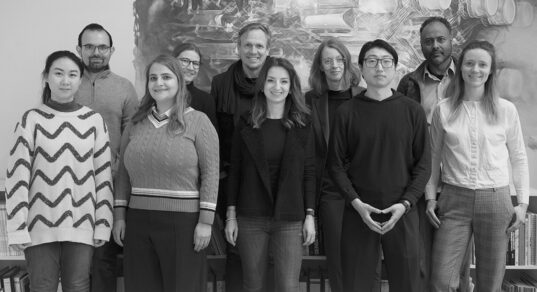
Left to Right: Xin Ying Chan, Dr. Alireza Javadin, Dr. Nazanin Saeidi ,Fanny Amelie Hirt, Prof. Dirk E. Hebel, Nadine Petsch, Sandra Böhm, Han Jun Yi , Zegeye Cherenet Mamo, Elena Boerman

Left to Right: Xin Ying Chan, Dr. Alireza Javadin, Dr. Nazanin Saeidi ,Fanny Amelie Hirt, Prof. Dirk E. Hebel, Nadine Petsch, Sandra Böhm, Han Jun Yi , Zegeye Cherenet Mamo, Elena Boerman
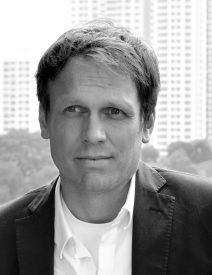
Master of Architecture, ETH Zurich, 1998
Master of Architecture, Princeton University, 2000
Contact: dirk.hebel@kit.edu
Professor of Sustainable Construction KIT Karlsruhe 2017-present / Dean of the Faculty of Architecture KIT 2019-present / Principal Investigator at FCL Singapore 2012-2020 / Assistant Professor of Architecture and Construction ETH Zurich 2012-2017 / Founding Scientific Director of the Ethiopian Institute of Architecture, Building Construction and City Development EiABC 2009-2012 / Visiting Critic Cornell University 2017 / Guest Lecturer Princeton University, USA, 2008 / Guest Professor Syracuse University, USA, 2008 / Visiting Lecturer, American University of Sharjah, UAE, 2005 and 2006
Dirk E. Hebel is Professor of Sustainable Construction and the Dean of the Department of Architecture at the Karlsruhe Institute of Technology, KIT, Germany. Prior to that, he was Assistant Professor of Architecture and Construction at ETH Zürich, Switzerland and a Principal Investigator at the Future Cities Laboratory in Singapore. He was also the Founding Scientific Director of the Ethiopian Institute of Architecture, Building Construction and City Development in Addis Ababa, Ethiopia. He was as well Guest Professor at Syracuse University, Guest Lecturer at Princeton University, and Hans and Roger Strauch Visiting Critic at Cornell University.
He is the author of numerous book publications, lately Sortenrein Bauen (2023, DETAIL with Ludwig Wappner et. al.), Clean Energy Transition and Digital Transformation (2023, Birkhäuser with Felix Heisel, Andreas Wagner and Moritz Dörstelmann), Circular Construction and Circular Economy (2022, Birkhäuser with Felix Heisel and Ken Webster), Urban Mining und Kreislaufgerechtes Bauen (Urban Mining and Circular Construction) (2021, Fraunhofer Verlag, with Felix Heisel), Addis Ababa: A Manifesto on African Progress (2018, Ruby Press, with Felix Heisel, Marta Wisniewska and Sophie Nash), Cultivated Building Materials (2017, Birkhäuser, with Felix Heisel), SUDU – The Sustainable Urban Dwelling Unit (2015, Ruby Press, with Melakeselam Moges and Zara Gray), Building from Waste: Recovered Materials in Architecture and Construction (2014, Birkhäuser, with Marta H. Wisniewska and Felix Heisel), and Cities of Change: Addis Ababa (2009/2016 (2nd revised edition), Birkhäuser, with Marc Angélil). In 2008, he published the book Deviations (2008, Birkhäuser, with Marc Angélil), an experiment in architectural design pedagogy and in 2005 Bathroom Unplugged (2005, Birkhäuser, with Jörg Stollmann).
Currently, Dirk E. Hebel is co-founder and partner of 2hs Architekten und Ingenieur PartGmbB Hebel Heisel Schlesier, practicing architecture with a focus on resource-respectful construction methods and materials. He was also one of the founding partners of INSTANT Architects (2002-2008). Latest building projects include the winning project of Solar Decathlon 21/22 RoofKIT (2022, 2hs (Prof. Karsten Schlesier) with KIT Faculty of Architecture), the Mehr.Wert Pavillion for the BUGA Heilbronn (2019, 2hs, Simon Sommer, Lisa Krämer, Philipp Staab, Sophie Welter und Katna Wiese); the UMAR (Urban Mining and Recycling) project in Zürich for EMPA Dübendorf (2018 ,together with Werner Sobek and Felix Heisel); MycoTree, a project for the Seoul Architecture Biennale (2017, with Felix Heisel, Karsten Schlesier, Nazanin Saeidi and Alireza Javadian in cooperation with the Block Research Group Zürich, Philippe Block, Matthias Rippmann and Juney Lee); a school house complex for 1200 students in Cambodia for the NGO Smiling Gecko (2016-2018, together with Lisa Devenoge, Lorine Grossenbacher, Franziska Matt, Elizabeth Müller, Alina Wyder, and Marcel Aubert), the New York NoWaste Vault for IDEAS CITIES (2015, with Felix Heisel, Samuel P. Smith, Nicholas Ashby, Ruben Bernegger in cooperation with the Block Research Group Zürich, Philippe Block, Tomas Mendez Echenagucia); DISCOVERIES, an exhibition for the Foundation Lindau Nobel Prize Winners with Tobias Klauser; ON_AIR, an installation for KunstWerke Berlin; the award-winning project UNITED_BOTTLE; and HausBlick Düsseldorf, all with Jörg Stollmann, INSANT Architects, all 2002-2008.
His work has been shown in numerous exhibitions worldwide, lately in Plastic: Remaking our world, Vitra Design Museum Weil am Rhein (2022), Environmental Hangover by Pedro Wirz (with Nazanin Saeidi and Alireza Javadian), Kunsthalle Basel (2022), SORGE UM DEN BESTAND, BDA, Berlin and others, (2020/21), CRITICAL ZONES, ZKM Karlsruhe (2020), FUTURIUM Berlin (2019), the Beazly-Design of the Year Exhibition (2018), The Design Museum London (2018), Fibre Fixed: Composites in Design Exhibition, Design Museum Gent (2018), ORGATEC, Köln (2018), Super Materials London (2017), UK, the Design Fair Cologne (2017), Köln, the Seoul Architecture Biennale (2017), South Korea, or the Venice Architecture Biennale (2021/2018/2016), Italy.
As Faculty Advisor (together with Prof. Andreas Wagner), he won the Solar Decathlon Competition 21/22 as part of the KIT RoofKIT team (Regina Gebauer and Nicolas Carbonare), he received the Green Solution Award 2021, one of the German Material Awards 2019, two Innovation Awards “Bauhaus 100 – Prototyping the Future” organized by the Federal German Government and German Industry in 2019, the New York Van Alen Institute Fellowship Award, the Red Dot Design Award for Best Conceptual Design, the SMART Innovation Grant Singapore, the JEC Asia Innovation Award, a ZUMTOBEL GROUP Award, the Suzanne Underwood Award for Best Design, and the LANXESS Award Singapore. He was also awarded the KIT Best Teaching Award, KIT Faculty of Architecture, 2019.
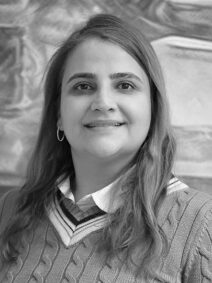
PhD, NTU Singapore, 2013
Master of Bioengineering, NTU Singapore, 2013
Contact: nazanin.saeidi@kit.edu
Senior researcher and Head of Research at the Chair of Sustainable Construction KIT Karlsruhe and Co-Principal Investigator at the Future Cities Laboratory of Singapore-ETH Centre, 2020 – present / Post-doc researcher at the Alternative Construction Materials Group at FCL Singapore, 2017-2020 / Post-doc researcher at the Department of Civil and Environmental Engineering at National University of Singapore NUS, 2014-2017 / Post-doc research fellow at the Singapore Membrane Technology Center, 2013-2014
Dr. Nazanin Saeidi is currently a senior researcher and Head of Research at the Chair of Sustainable Construction at the Karlsruhe Institute of Technology KIT. She is also a Co-Principal Investigator of the Urban-Biocycle Project at the Future Cities Laboratory of Singapore-ETH Centre of Sustainability in Singapore. She is focusing on upcycling plant-based waste products and turning them to ecological products with the aid of fungal mycelia as a natural binder.
In her PhD at Nanyang Technological University in Singapore she worked on “Engineering microbes to sense and eradicate a human pathogen”. Her thesis work was impressive enough to get a publication space under Molecular Systems Biology (MSB) from Nature publishing Group, 2011, it was then featured in more than 70 public and academic media.
In 2013, she was appointed as a postdoctoral research fellow at the Singapore Membrane Technology Centre where she was working on “development of improved strategies to control Biofouling of membranes in water industry”. In 2014, she joined the department of Civil and Environmental Engineering at National University of Singapore to persuade a new research experience where she was focusing on “Emerging microbial contaminants of concern in tropical urban catchments” and “The effect of diverse land use on the geospatial distribution of Emerging microbial contaminants of concern in tropical environments”.
During her academic life, she has received several awards and recognition from different conferences. Her recent distinguished success is to be named as one of the 20 emerging innovators in Asia Pacific by MIT Technology Review in 2020 for her work on sustainable construction materials.
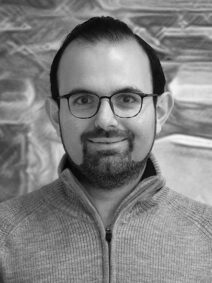
PhD, ETH Zürich, 2017
Master of Civil Engineering, NTU Singapore, 2010
Master of Civil Engineering, NUS Singapore, 2011
MBA, ARU Oxford, UK, 2012
Contact: alireza.javadian@kit.edu
Senior researcher and Head of Research at the Chair of Sustainable Construction KIT Karlsruhe and Co-Principal Investigator at the Future Cities Laboratory of Singapore-ETH Centre, 2020 – present / Post-doc researcher at the Alternative Construction Materials Group at FCL Singapore, 2012-2020 / Civil Engineer at ‘Beca Carter Hollings and Ferner’ Singapore, 2010-2012 / Researcher at NUS Singapore, 2009-2010 / A*STAR Singapore scholarship recipient at NTU Singapore, 2007-2009
Dr. Alireza Javadian is currently a senior researcher and Head of Research at the Chair of Sustainable Construction at the Karlsruhe Institute of Technology KIT. He is also a Co-Principal Investigator of the Urban-Biocycle Project at the Future Cities Laboratory of Singapore-ETH Centre of Sustainability in Singapore. Alireza Javadian is currently working on the development of sustainable building materials made from renewable resources. His work on engineered bamboo and mycelium-bound building elements explore the idea of a new class of biological driven constrution materials embeded within a true circular economy.
He has received the distinguished award by Singapore government for his work on development of Organic Fiber Composite Materials for Construction on the 50th anniversary of Singapore’ independence in 2015. Furthermore, he won the SMART Innovation Grant Singapore, the SAWIRIS Grant from ETH Zürich, a Swiss KTI project fund from Swiss National Research Foundation, and a ZUMTOBEL GROUP Award together with the research team in Singapore and Zürich. He has also co-founded the Spin-off company Widuz to commercialize high performance bamboo composite materials.
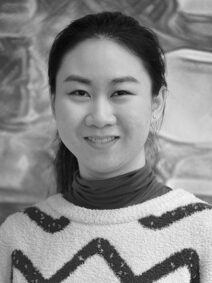
M.Sc Mechanical Engineering, NUS, Singapore, 2023
Contact: xin.chan@kit.edu
Doctoral Student at the Institute of Industrial Production (IIP) KIT Karlsruhe 2025 – present / Research Associate at the IIP KIT Karlsruhe 2025 – present/ Research Assistant at the National University of Singapore 2024/ M.Sc at the National University of Singapore 2023/ Project Officer at Nanyang Technological University Singapore 2020-2022
Xin Ying Chan is a Research Associate and Ph.D. candidate at the Institute of Industrial Production (IIP), Karlsruhe Institute of Technology (KIT). She holds an M.Sc. and B.Eng. from the National University of Singapore (NUS).
Her research focuses on mycelium composite applications and the development of production processes for the circular economy. She has gained experience in sustainable material production across various fields, including the development of bacterial-cellulose substrates from Kombucha and the design and testing of microstructure of ceramics.
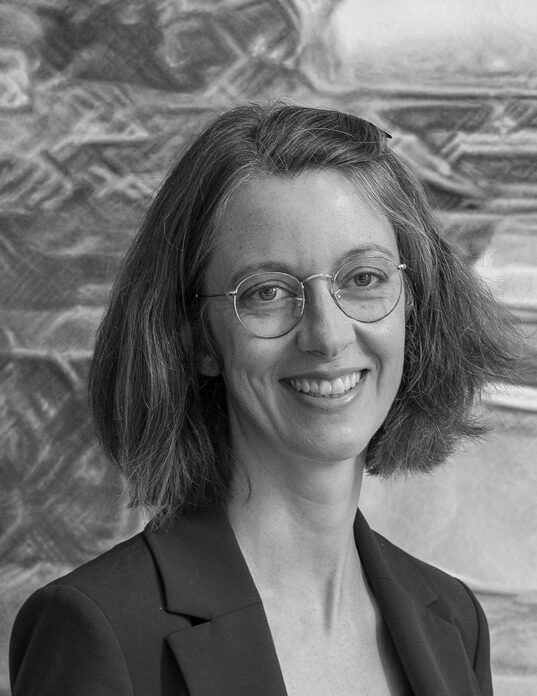
Dipl. Designer, Product Design, University of Art and Design Karlsruhe, 2014
Contact: sandra.boehm@kit.edu
Doctoral Student at the Chair of Sustainable Construction KIT Karlsruhe 2021 – present / Lecturer and Researcher at the Chair of Sustainable Construction KIT Karlsruhe 2017 – present / Freelance Work as Designer 2015-2020 / Designer at Fachwerk Marketing GmbH 2016-2017 / founding Sandra Böhm Produktdesign 2015 / Assistant at Jerszy Seymour Designworkshop Berlin 2013 / Assistant at Studio Judith Seng und Alex Valder Berlin 2013
Sandra Böhm is a lecturer and researcher at the Chair of Sustainable Construction at KIT Karlsruhe. She studied product design at the Karlsruhe University of Arts and Design, where she graduated in 2014. Her diploma thesis Komposita dealt with the recycling of biogenic waste materials and was presented at numerous exhibitions and trade fairs. In her doctoral thesis at KIT, she is researching the recycling of biogenic residues within the construction industry with a focus on bio-based insulation materials. She recently presented her research in a reviewed paper and talk at the Real Corp 2023 – let it grow, let us plan, let it grow conference in Ljubljana, Slovenia. Together with Elena Boerman, she is responsible for the KIT Material Library and its continuous development. The KIT Material Library focuses on circular architecture, as well es on sustainable and future-oriented building materials. In addition, she organizes and holds the material lecture series in the 1st semester and regularly organizes practice-oriented research seminars for master students.
Sandra Böhm published some articles and papers, recently the reviewed paper The Potential of Bio-Based Insulation Materials for Healthy Living Spaces and Sustainable Architecture (CORP – Competence Center of Urban and Regional Planning, 2023. URL: https://conference.corp.at/archive/CORP2023_90.pdf, doi:10.48494/REALCORP2023.3090) and the book chapter Der ästhetische Reiz der urbanen Mine (Heisel, Felix, und Dirk E. Hebel (Hrsg.). Urban Mining und kreislaufgerechtes Bauen. Die Stadt als Rohstofflager. Fraunhofer IRB Verlag, 2021).
Before taking her position at the KIT, she developed her own projects dealing with furniture design and experimental work on materials and material development. During her studies at the University of Art and Design Karlsruhe she also worked as an assistant at Jerszy Seymour Design Workshop Berlin and at Studio Judith Seng und Alex Valder in Berlin.
Sandra Böhm has already presented her projects in numerous exhibitions. Especially her furniture series Prei, which is made of recycled paper, has already been attracted by a number of exhibitions, such as in Circular Thinking “Innovation of Interior” – From Upcycling to Biofabrication, interzum, KölnMesse (2017), Es war einmal…, Passagen – Interior Design Week Köln, Galerie Kunst&So (2017), Have a seat, Saarländisches Künstlerhaus Saarbrücken (2016), Eunique, Messe Karlsruhe (2015), Salone Internazionale del Mobile, Milan, kkaarrlls (2012, 2013, 2014).
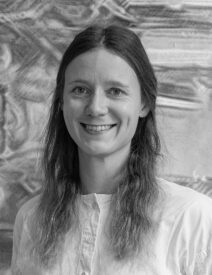
M.Sc of Architecture, KIT, Karlsruhe, 2021
Contact: elena.boerman@kit.edu
Teaching Assistant and Researcher at the Chair of Sustainable Construction KIT Karlsruhe 2021 – present / Student Assistant at the Chair of Sustainable Construction KIT Karlsruhe 2020-2021 / M.Sc. Architecture, KIT, Karlsruhe 2018-2021 / AAg LoebnerSchäferWeber Freie Architekten BDA, Heidelberg, 2018-2021 / Schenk & Fleischhaker Architekten, Hamburg, 2017-2018 / B.Sc. Architecture, KIT, Karlsruhe, 2014-2017
Elena Boerman is a research assistant in teaching and research at the Chair of Sustainable Construction at the Department of Architecture at the Karlsruhe Institute of Technology (KIT). She holds a Master and Bachelor of Science in Architecture from KIT.
In her master’s thesis, she dealt with the urban spaces and architectures of post-war modernism and their contemporary and sustainable transformation. For her master’s thesis with the title „The Value of an Architecture of Permanence – The Climate and Resource Appropriate Transformation of the Architectural Heritage of Post War Modernism“ she won recognition of the Friedrich-Weinbrenner-Prize 2021.
Since 2023, she has been pursuing her doctorate at KIT on the topic of determining and targeting greenhouse gas emissions as a control instrument for the circular economy in construction.
She is editor of the book ‘Building with Renewable Materials – Nature as a Raw Material Source’ (Fraunhofer IRB Verlag, 2024, with Dirk E. Hebel and Sandra Böhm). Together with Sandra Böhm, she is responsible for the materials library of the Department of Architecture and is involved in design courses and seminars for architecture students focusing on circular construction and the use and reuse of innovative and future-oriented building materials.
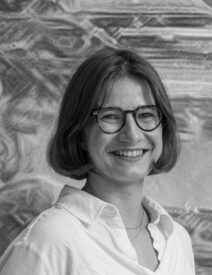
M.Sc of Architecture, KIT, Karlsruhe, 2021
Contact: fanny.kaiserhirt@kit.edu
Teaching Assistant and Researcher at the Chair of Sustainable Construction KIT Karlsruhe 2024 – present / Architect at SSP ag, Karlsruhe 2021 – 2025 / M.Sc. Architecture, KIT, Karlsruhe 2018-2021 / rw+ Gesellschaft von Architekten mbH, Berlin 2017-2018 / B.Sc. Architecture, btu, Cottbus, 2013-2017
Fanny Amelie Kaiser Hirt is currently working as a teaching assistant at the Chair of Sustainable Construction at KIT Karlsruhe. She is a registered German Architect and gathered practical experience in an integral planning team by working on public construction projects such as a conversion of a concert hall.
She holds a Master of Science in Architecture from the Karlsruhe Institute of Technologie (KIT) and a Bachelor of Science degree in Architecture from the Brandenburgischen Technischen Universität Cottbus (BTU). In her master’s thesis, she dealt with the transformation of a large department store in the urban context of Heidelberg. She showed material, architectural and urban planning strategies for re-integrating a monostructures in the heterogeneous urban setting. For her master’s thesis with the title „Transformation Department Store – Redefining Heidelberg City Centre “ she won recognition of the Schelling Student Prize 2021.
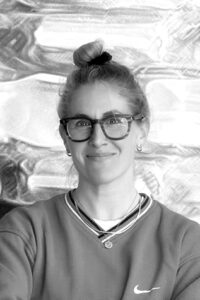
M.Sc of Architecture, KIT, Karlsruhe, 2021
Contact: lisa.behringer@kit.edu
Teaching Assistant and Researcher at the Chair of Sustainable Construction KIT Karlsruhe 2025 – present / acute. Architektur und Stadtplaung, Freiburg, 2022 – present /Student Assistant at the Chair of Architectural Space and Design KIT Karlsruhe 2020-2021 / M.Sc. Architecture, KIT, Karlsruhe 2018-2021 / FAR – frohn & rojas, Berlin, 2018 / LR Architekten, Karlsruhe, 2015-2020 / B.Sc. Architecture, KIT, Karlsruhe, 2014-2017
Lisa-Maria Behrigner is currently working as a teaching assistant and researcher at the Chair of Sustainable Construction at KIT Karlsruhe. She is a registered German Architect and holds a Master and Bachelor of Science in Architecture from the Karlsruhe Institute for Technology (KIT)
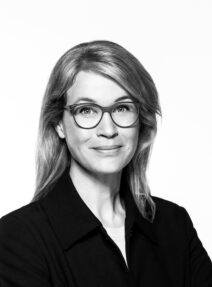
M. Sc. of Architecture and Environment, University of Applied Sciences Wismar, 2012
Dipl.-Ing. (FH) Architecture, University of Applied Sciences Stuttgart, 2008
Contact: daniela.schneider@partner.kit.edu
Researcher at the Chair of Sustainable Construction KIT Karlsruhe 2020 – present / Lecturer at University of Applied Sciences Stuttgart, 2017-2020 / Team Lead at EPEA GmbH – Part of Drees & Sommer, Stuttgart, 2019 – present / Project Partner at Drees & Sommer ABT, Stuttgart, 2016-2019 / Project Engineer, Technology Center Sustainable Construction at Ed. Züblin AG, Stuttgart, 2012-2016 / Site Manager and Project Manager at BAM Deutschland AG, Stuttgart, 2008-2012
Daniela Schneider is currently a PhD student at the Chair of Sustainable Construction at KIT Karlsruhe. Her research activities focus on the design of circular constructions and circular joining techniques. She is examining the question which impact have joining techniques on the circularity of building component designs.
She lectures at the WINGS Wismar in the study course architecture and environment with a focus on circular design, planning and construction. Between 2017 and 2020, she was a lecturer at the University of Applied Sciences Stuttgart. Previously, she was a guest lecturer at the University of Applied Sciences in Konstanz and at the University of Stuttgart.
Currently she is a team leader of the Cradle to Cradle real estate team at EPEA GmbH in Stuttgart. She develops material and recycling concepts for circularity buildings. Her focus is on creating healthy and waste-free building structures. She practices architecture with a focus on minimalist, resource-friendly and separable building methods, materials and constructions.
Daniela Schneider is a member of the “Disassembling and Recyclability” expert group of the German Sustainable Building Council (DGNB). As an auditor for the German Sustainable Building Council, she accompanies building certifications and serves on the advisory board for circular construction.
Daniela Schneider is co-author of the publication “Urban Mining and Circular Construction” (2020, ed. Dirk E. Hebel and Felix Heisel). She elaborated keywords for circular construction for the Ecological Building Materials Dictionary (2018, ed. Wolfgang Linden and Iris Marquardt). A further publication is “Cradle to Cradle inspired smart cities” in the publication “Smart Cities” (2020, ed. Chirine Etezadzadeh).
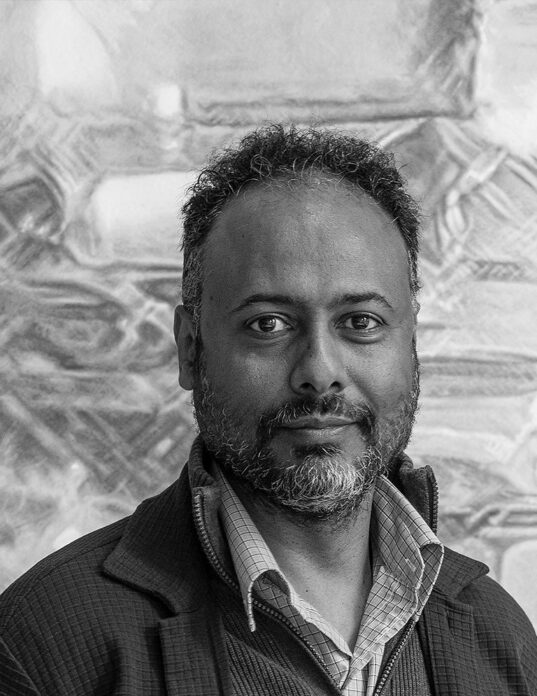
Visiting Scientist at KIT since Oct. 2024.
Assistant Professor Architecture and Urbanism – EiABC, AAU. (B.Sc, AAU-Ethiopia; M.Arch. IIT Roorkee, India, PhD. HCU Hamburg, Germany).
>Teaching: Architectural design (studio), Architecture and Urbanism in Africa (theory) in various universities in Ethiopia and Europe.
>Research area: Reflexivity and Responsiveness in Architecture – ‘Reflexive architecture’: basis for architectural space production in rapidly urbanizing regions (focusing on socio-spatial transformations); ‘Responsive architecture’ – Spatial design (as a strategy) to guide emerging urbanization towards goals of Sustainability (Focusing on environmental rehabilitation and livelihood production).
>Practice: Founding partner and general manager of OADUS architecture and engineering plc – Office for architecture, design and urban studies – Addis Ababa, Ethiopia (since 2009).
>Service: Head of Emerging Cities Lab-Addis Ababa – a collaborative research lab between EiABC-AAU and Bauhaus University, Germany) focusing on guiding rapid urbanization (ECL-AA ); Head of Competence Center for Architecture and Design-EiABC-AAU; Founder and General Manager of Alliance for Building Communities (ABC) – a think-tank and a voluntary professional action group for promoting grassroots urbanization and community building.
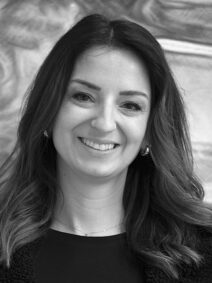
Contact: nadine.petsch@kit.edu
Secretary of the Chair for Sustainable Construction at Karlsruhe Institute of Technology (since 2024) / Social Media Manager and Responsible for Product Range Design and Market Analysis (2020–2024) / Assistant to the Management (2013–2020) / Marketing Communication Specialist (2011–2013), State-Certified Fashion Designer (2007–2010)
Since 2024, Nadine Petsch has been leading the secretariat of the Chair for Sustainable Construction at the Karlsruhe Institute of Technology (KIT). Prior to this, she worked for several years in various responsible positions, including as a Social Media Manager and in product range design and market analysis in the industry. Her extensive experience in assisting management and her professional training as a marketing communication specialist and state-certified fashion designer complement her work in the field of sustainable construction with a creative and strategic perspective.
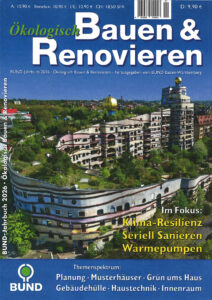
Steiff, Peter. “Zirkuläres Bauen. Regeneratives Baustoff-Management.” BUND Jahrbuch 2026, January 2026.
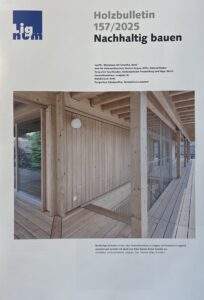
Glanzmann, Jutta. “Holz Als Basis Für Eine Nachhaltige Baukultur.” Lignum Holzbulletin 157/2025, no. Nachhaltig bauen (2025): 4058–59.
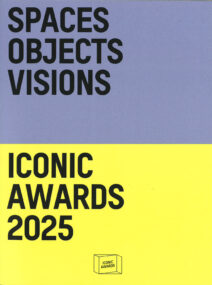
Dietzold, Lutz, ed. Iconic Awards 2025 – Spaces Objects Visions. Frankfurt: Rat für Formgebung GmbH, 2025.
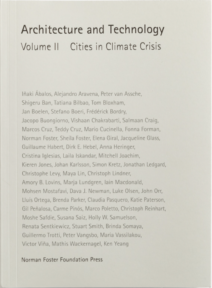
Hebel, Dirk E. “Activating the Urban Mine.“ In Architecture and Technology Volume II: Cities in Climate Crisis. Madrid: Norman Foster Foundation Press, 2025.

Hebel, Dirk E. und Felix Heisel. “Die Stadt als Ressource.” In Für eine nachhaltige Architektur der Stadt. Berlin: Verlag Klaus Wagenbach, 2025.
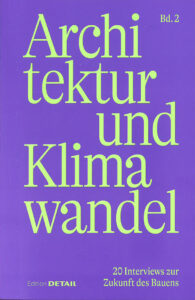
Hebel, Dirk E. “Vom Linearen Zum Kreislaufsystem.” In Architektur Und Klimawandel. München: Edition DETAIL, 2025.
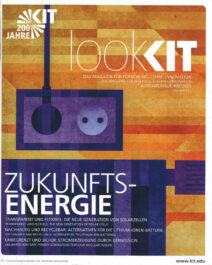
Hebel, Dirk E. Interview: “Wir müssen endlich anfangen, den CO2-Ausstoß zu messen – nicht nur, wie dick die Dämmung ist.” Interview by Christoph Karcher. LooKIT 0225, 2025.
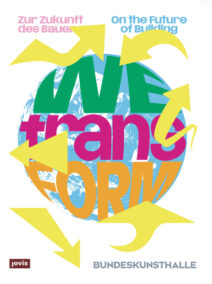
BUNDESKUNSTHALLE, ed. WEtransFORM – Zur Zukunft Des Bauens. Berlin: jovis Verlag, 2025.
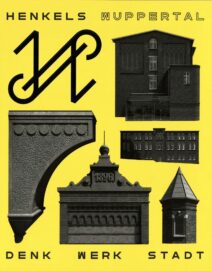
Renaissance AG, ed. Henkels Wuppertal – DenkWerkStadt. Wuppertal: renaissance Immobilien und Beteiligungen Aktiengesellschaft, 2025.
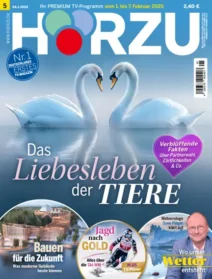
Monkenbusch, Helmut. „Bauen für die Welt von morgen.“ Hörzu, 24.1.2025
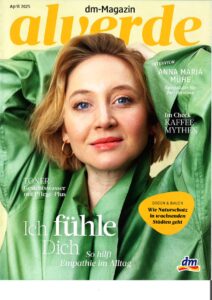
Hebel, Dirk E., Tanja Hildbrandt. „ Pilze – Netzwerker im Untergrund“. alverde, dm-Magazin, April 2025.
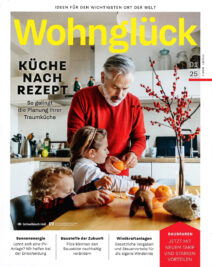
Merkert-Andreas, Carolin. “Pilze Sind Vielseitig.” Wohnglück, January 2025.
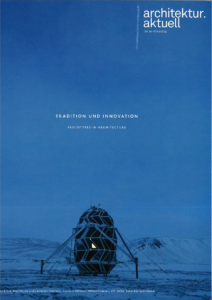
Boerman, Elena, and Dirk E. Hebel. “RoofKIT – Kohlenstoffspeicher Und Materiallager.” Architektur.Aktuell, vol. 12.2024, no. Tradition und Innovation, Dezember 2024, pp. 98–109

Hebel, Dirk E. Interview: “Vom linearen zum zirkulären Kreislaufsystem.” Interview by Sandra Hofmeister, DETAIL 11.2024, Nov. 2024.

Hebel, Dirk E., Sandra Böhm, Elena Boerman, Hrsg. Vom Bauen mit erneuerbaren Materialien – Die Natur als Rohstofflager. Stuttgart: Fraunhofer IRB Verlag, 2024.
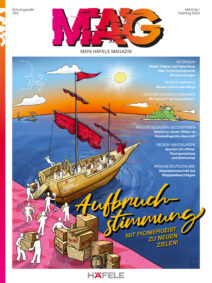
Hebel, Dirk E. “In Kreisläufen denken, entwerfen und wirtschaften.” MÄG – Mein Häfele Magazin, 2024.
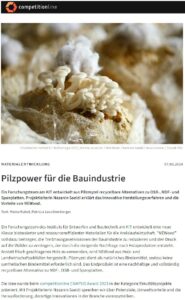
Rubel, Maike, and Patricia Leuchtenberger. Interview: “Pilzpower für die Bauindustrie.” competitionline, 7 June 2024, https://www.competitionline.com/de/news/schwerpunkt/pilzpower-fuer-die-bauindustrie-7283.html.
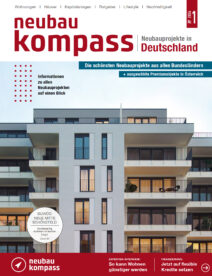
Müller, Janek. “Baumaterialien der Zukunft: Pilze, Hanf und Algen.” neubau kompass – Neubauprojekte in Deutschland, May 3, 2024. https://www.neubaukompass.de/premium-magazin/.
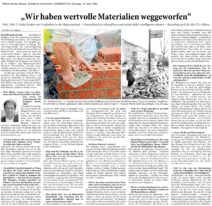
Sören, S. Sgries. “Interview: ‘Wir haben wertvolle Materialien weggeworfen.’” Rhein-Neckar-Zeitung, April 27, 2024, SÜDWEST I 28 edition, sec. Sinsheimer Nachrichten.

Schweikle, Johannes. “Auf Pilz gebaut.” Stuttgarter Zeitung, April 23, 2024, sec. Die Reportage.
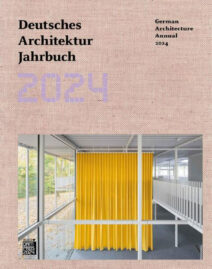
Klaaßen, Lars. “Organische Architektur – Pilzmyzel und Flachs als Materialien für die ökologische Bauwende.” In Deutsches Architektur Jahrbuch 2024, edited by Peter Cachola Schmal, Yorck Förster, and Christina Gräwe, 198–209. Berlin, Germany: DOM publishers, 2024.
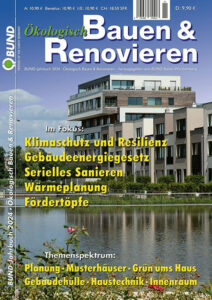
Streiff, Peter. “Zirkuläres Bauen – Kreislauf statt Abriss.” BUND-Jahrbuch – Ökologisch Bauen & Renovieren 2024, January 2024.
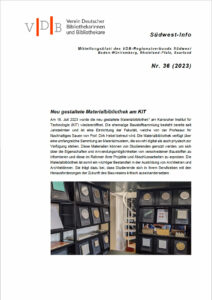
Mönnich, Michael, and Sandra Böhm. “Neu gestaltete Materialbibliothek am KIT.” Südwest-Info: Mitteilungsblatt des VDB-Regionalverbands Südwest Nr. 36 (2023), 2023.
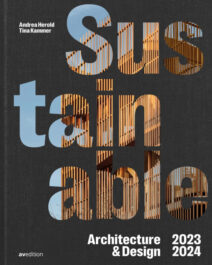
Hebel, Dirk E. “RoofKIT Wuppertal, Germany; Interview with Prof. Dirk Hebel: The aim is clear, we must forge the path ourselves.” In Sustainable Architecture & Design 2023/ 2024, edited by Andrea Herold, Tina Kammerer, and InteriorPark., 46–55. Stuttgart, Germany: av edition GmbH, 2023.
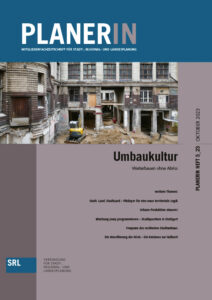
Hebel, Dirk E. “Der Bestand ist die künftige Ressource – Den linearen Umgang mit Baumaterialien schnellstmöglich stoppen.” Planerin – Mitgliederfachzeitschrift für Stadt-, Regional- und Landesplanung, Oktober 2023.
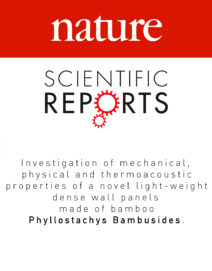
Gholizadeh, Parham, Hamid Zarea Hosseinabadi, Dirk E. Hebel, and Alireza Javadian. “Investigation of Mechanical, Physical and Thermoacoustic Properties of a Novel Light-Weight Dense Wall Panels Made of Bamboo Phyllostachys Bambusides.” Nature Sientific Reports 13 (October 26, 2023). https://doi.org/https://doi.org/10.1038/s41598-023-45515-3
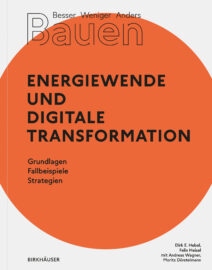
Hebel, Dirk E., Felix Heisel, Andreas Wagner, und Moritz Dörstelmann, Hrsg. Besser Weniger Anders Bauen – Energiewende und digitale Transformation. Besser Weniger Anders Bauen 2. Basel: Birkhäuser Verlag GmbH, 2023.
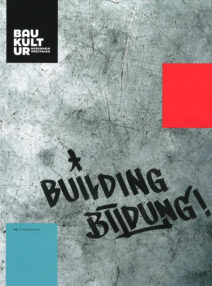
Hebel, Dirk E. “Vom Jagen, Züchten Und Ernten Zukünftiger Baumaterialien.” Baukultur Nordrhein Westfalen, September 2023.
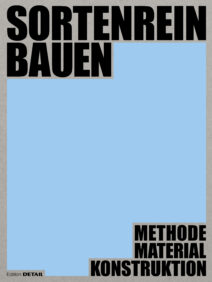
Hebel, Dirk E., Ludwig Wappner, Katharina Blümke, Valerio Calavetta, Steffen Bytomski, Lisa Häberle, Peter Hoffmann, Paula Holtmann, Hanna Hoss, Daniel Lenz and Falk Schneemann, eds. Sortenrein Bauen – Methode Material Konstruktion. Edition DETAIL. München: DETAIL Business Information GmbH, 2023.
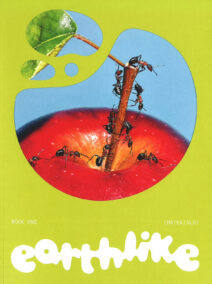
Schweikle, Johannes. “Fungi.” In Earthlike, 1:70–75, 2023.